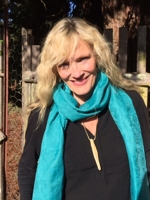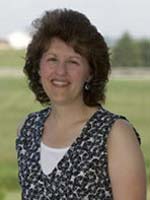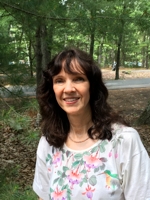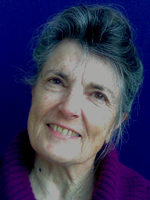Issue Number 33, Summer 2016
Contents
- Cloud, Burr by Claudia Monpere
- Ponderosa by Claudia Monpere
- The Zion Narrows by Claudia Monpere
- Somewhere in Barstow by Ryan Mattern
- So Much Depends by Robin Chapman
- Black Phoebe by Devreaux Baker
- Nostalgia for the Rain by Devreaux Baker
- Chameleon by Sierra Jacob
- Charms Against Jealousy by Madeline Wiseman
- Coming Close by Julie L. Moore
- Sightseeing by Julie L. Moore
- Hubris by Kristina Hakanson
- Last Day of Zoo Camp by Lucille Lang Day
- Lone Pine and Mt. Whitney by Grace Marie Grafton
- Prophecy by Mark Trechock
- Startled by Sally Bliumis-Dunn
- Still Life With Invasive Species by Ed Taylor
- The Long Piers by James Toupin
- Trillium by Anna Lena Phillips Bell
- Wisdom of Solomon by Dan Jacoby
Archives: by Issue | by Author Name

Cloud, Burr
by Claudia Monpere
Claudia lives in the Oakland hills in the Temescal Creek watershed-- home to deer, turkeys, and an occasional mountain lion.

Cloud as white peony opening
as skein of yarn, lamb whorl,
as Lake Pearl.
Sizzit, sizzit calls the bird. Sun bold,
the squabbles and songs of morning
dove, peacock, rooster, crow, finch.
Bird as cloud.
Long ago our earth decided:
stop nothing.
Let everything tendril and husk.
I walk in the orchard where one hundred
sticker burrs attach to my pants,
where wasps hover over green apples
and the soil scrawls its hunger.
We swallow clouds to soften.
This atrium swallows
light through glass.
The heart’s atrium swallows
blood from lungs.
And clouds: they vanish
in the geometry of hours.
© Claudia Monpere

Ponderosa
by Claudia Monpere
Claudia lives in the Oakland hills in the Temescal Creek watershed-- home to deer, turkeys, and an occasional mountain lion.

The pines, green triangles of light.
The pines, gathered at meadow’s edge
where rumors of drought have scorched the grasses.
To observe this particular light is to pray
to unexpected layers and dusty sediments.
Too long have the bones been stacked.
Longer than the birth of the first galaxy
there is that much grief.
She knits and knits and still the threads are naked, burn boiled in the grief pot
drenched in the surveillance of stars.
© Claudia Monpere

The Zion Narrows
by Claudia Monpere
Claudia lives in the Oakland hills in the Temescal Creek watershed-- home to deer, turkeys, and an occasional mountain lion.

All day the canyon walls flaunt color:
amber, blush, vermillion, barn shadow.
All day the Virgin River carves.
Now still, sun-pricked pools
swallow knees, hips.
Now twisting, hissing, tumbling
unnamed rocks beneath our feet.
Unnamed triangle of sky.
Speak, cliffs, of slot
canyon wounds, of moon lilies
planted in divots of thin soil.
Of walking sticks steadying
for the one fierce fall. All the arches, alcoves,
potholes, all the cracks and grooves,
how everything is forced
open eventually into one frame
here in this shadowed gorge.
Why should we fear and what and what?
© Claudia Monpere

Somewhere in Barstow
by Ryan Mattern
Ryan lives on the Monterey Bay Peninsula, but grew up in the valley between Mt Baldy and Mt San Jacinto, on the San Andreas Fault and the Santa Margarita Watershed.

When you leave here, go to the beach.
Sift through the dolphin carcass –
the one that made regional news,
was left as a statement
against commercial fishing
or nuclear energy or smoking
(you could never follow) ––
and find the mushrooms growing
through its shining, gull-picked
ribs. Dust off the sand and fire-
weed pollen. Sing the song
your grandmother taught you
when the two of you named
stars on a serape somewhere
in Barstow. The night sky
was oil running over asphalt.
You forget some of the lyrics.
It’s ok, you repeat, until they return.
© Ryan Mattern

So Much Depends
by Robin Chapman
Robin lives in the Yahara Watershed and can canoe her way from there to, eventually, the Mississippi.

on an eye for consequence—
hiking down the gravel road
past banks emptied of gentian
and goldenrod, shorn of jewelweed
and vine, cut back to a stubble
of stems and old leaves, we come
to a curve suddenly thick
in maidenhair fern and blue vervain,
Solomon’s seal, true and false,
and at its end a Styrofoam plate
nailed on a tree for a sign:
its lettered black command
DO NOT MOW BANK enough
to stop the driver doing his job
for the DNR, saving one
small remnant of the wild.
© Robin Chapman

Black Phoebe
by Devreaux Baker
Devreaux lives on the coast of the Pacific Ocean in the Big River Watershed.

This morning waking alone in the cabin
the blue gray arms of sky just above
the bending trees pulling me up out of bed
to stand at the window bare feet planted
on bare boards praying without knowing I was
praying for all the living we have left to do
and somewhere the song of one bird someone
named Black Phoebe etched itself in a simple
line against the breaks in my heart and I whispered
this is a good morning for birds and bare feet
and for all the living we have left to accomplish
even though time is such a reckless car flaming
us always toward such unexpected dips and turns
but standing like this planted in the morning
I felt that familiar voice grass and yellow
fields speak calling me to go outside
and walk to the barn and from there
follow the path that leads with her face
of such indeterminate longing
all the way to the sea.
© Devreaux Baker

Nostalgia for the Rain
by Devreaux Baker
Devreaux lives on the coast of the Pacific Ocean in the Big River Watershed.

It began with a tin roof
sounds like silver sticks
falling from air
a dash of bird feet
despair or love at all the edges
It began with a car
gleaming bumpers
wind shield wipers forming a pattern
of lost and found
the truth of the seen versus
the unseen
It began with a picnic
wicker baskets of fruit
grass still dazed from a sudden
shower
It was spring
or was it fall
the brush of winter
woven into scarves
It arrived in the blue smell
at the base of clouds
became a dark thought
fell in torrents
released us from ourselves
It began with a mattress
on the cabin floor
the smell of wet pines
redwoods singing
in hidden groves
It came in a rush
unfolded wet knees
a vertebrae of desire
It began with your body
in the afternoon
the smell of rain
conjuring memories
silver sticks falling across
our shoulders
A dash of bird feet
on all the rooftops
of the world
© Devreaux Baker

Chameleon
by Sierra Jacob
Sierra lives and writes beneath the lei of Haleakala, in the Kuiaha Gulch watershed.

You remember afternoons with cousins
picking up Jacksons, plucking them from lime branches
like razor backed jewels. Watching them fail to pause
when they reached the end of a finger
you would pass them between skinny arms
to keep the glowing bodies in motion.
Most would darken as they climbed along brown forearms
changing to match hairs bleached with sun.
For some it didn’t come so easily --
they would simply grow brighter
eyes swiveling in awe and confusion.
© Sierra Jacob

Charms Against Jealousy
prunus cerasus
by Madeline Wiseman
Madeline lives in the Salt Watershed, a few easy bikeable miles or less to four tributaries of the Platte River—Salt Creek, Oak Creek, Antelope Creek, and Dead Man’s Run.

Because sour cherries pucker
the mouth, they are for the songbirds,
a living feeder that needs watering.
Because they were mislabeled
as honeycrisp apples and planted
in the parking lot, they are illegal in the city.
They are sour because they break the laws
and hunker down in blue collar suburbia
to give the slip to corporate farming—
which would make anyone sour, all this hiding,
biding, pretending not to live at all.
Bought for sweetness and they pinch
the lips, an almost kiss, open-eyed
and startled—semi-dwarfs, foreign
rootstock, temperamental producers.
Worst, they’re eaten just because
they’re all that’s there. They’re like survivors
at a class reunion, still slender and fit,
made youthful by kale and cherry smoothies
years later, making everyone sour, betwixt, mean.
I hug them, can’t detect which are modified,
which pitted, which sweet against the odds.
© Madeline Wiseman

Coming Close
by Julie L. Moore
Julie moved to Indiana four years ago and now enjoys long walks among the fields, foliage, and fowls along the Mississinewa River Watershed.

Mule deer gather
in the Strawberry Valley,
feeding as the moon
in its white robe
nudges the sun, drowsing
along the horizon, to bed.
The animals allow
my daughter and me
to come close,
one snorting, yes,
but the other five
looking up, nerves mute,
sounding no senseless
alarm, then lowering
their mouths to the meadow,
the grass’s old familiar tune
fading in, humming
on all our tongues.
First appeared in The Midwest Quarterly
© Julie L. Moore

Sightseeing
by Julie L. Moore
Julie moved to Indiana four years ago and now enjoys long walks among the fields, foliage, and fowls along the Mississinewa River Watershed.

We drove through Yellowstone,
winding through its burnt edges,
blackened trees on one side,
lush hills on the other,
in the middle of June.
The traffic was heavy,
engines burning up serenity
like fire consumes aspen
and pine, exhaust casting
its dark shadow onto the road.
We slowed to a stop
beside a buffalo
lounging like a Lab
within the short length
of my arm. They have rules
in the park, and this proximity
broke one. I could’ve touched
its mane, full as a huckleberry bush,
brown as the earth itself.
I could’ve fingered
the sharp tips of its horns.
And while my kids tried to enforce
the law from the back seat,
my husband nervous at the wheel,
I did what anyone does
when she looks into the eyes
of endurance, crosses the border
beyond belief. I rolled down
my window, zoomed in close,
and snapped the picture.
From Particular Scandals by Julie L. Moore. Used by permission of Wipf and Stock Publishers. www.wipfandstock.com
© Julie L. Moore

Hubris
by Kristina Hakanson
Kristina hails from the headwaters of the Klamath River in southern Oregon, and recently moved to central Arizona where she enjoys living and writing among the wide species diversity of the Sonoran Desert.

I. Testing
Our lives and livelihoods depend
on chemistry with a little fallout mixed in.
We bore into the earth just to blow it
up from the inside, hiding, but the wind
makes women’s breasts atomic.
We grow tumors and lose our hair,
even men have mastectomies.
Our species has been alive a long time.
Look at the man with bionic legs,
hear the physicist speak through his machine,
keep up with the Hollywood news,
eat from Styrofoam packages (use a spork),
smell the coconut of her sculpted thighs and answer:
how do we know when we are awake?
II. Burning
We humans with our sanitized bathrooms,
our waxed legs, invisible menses, over-large
houses, drones, skin never sticking to skin.
The inescapable subconscious stockpiles
blood and kitchen compost, artillery and oil,
let us feel the exact weight of the dead kitten
carried from driveway to backyard
where the upturned earth smells new
and our mouths say “grave” while hands
place her there. When the dirt’s
back in the hole, the reptilian brain is too.
We dream of holding her, of the warmth moaning
out of her body. We can’t wake up or leave.
Not that we’re going anywhere, not that our
back muscles don’t ache under the freight of transport—
somebody has to mule the potatoes and onions
from one psychic riverbank to another, feed
our anxieties and egos, entrust our lives
to an impatient river as we learn to swim.
© Kristina Hakanson

Last Day of Zoo Camp
by Lucille Lang Day
Lucy lives in the San Francisco Bay Delta Watershed, which covers more than 75,000 square miles. Her particular corner of this vast watershed is the watershed of Pleasant Valley Creek, which unfortunately now runs mostly under Grand Avenue in Oakland.

Children, in blue-and-gold
Zoo Camp tee shirts, gather
at picnic tables on a hilltop
shaded by pines. They have met
the boa with its reddish brown
camouflage pattern; baboons
with butts callused for comfort;
fruit bats, which cannot
echolocate but see better
than any other bat; sun bears
with orange necklaces of fur;
and turtles, whose favorite
color is red. The little train
has taken the campers past
wallabies, emus and kangaroos,
which cannot walk backward.
They have hidden treats
for chimpanzees, whose DNA
is ninety-eight point four
percent identical to their own,
and watched them eat, eager
as children finding candy.
Now the campers sing about
penguins, which can stay
underwater for twenty minutes;
hippos with four-foot-tall smiles;
and tigers with striped skin
beneath their striped fur.
Parents and grandparents
look on—remarkable mammals
with twenty-six bones in each
foot, a nose that can remember
fifty thousand scents, a brain
that’s eighty percent water,
and a charge to save this planet
where they are outweighed
by termites, ten to one.
© Lucille Lang Day

Lone Pine and Mt. Whitney
by Grace Marie Grafton
Grace lives in the wooded hills of Oakland, California, in the Sausal Creek watershed. Outside her kitchen door is a second growth redwood tree, part of a landscape that was blanketed with old-growth redwoods at the time of the California gold rush, and a short walk east from her house is the wilderness area of Redwood Regional Park, where she loves to hike.

The mountains and their lunatic height provide
so ready a drama the settlers need never fear
going soft, being bored or feeling life's too
easy. Almost perpendicular, the peaks rise
behind the desert house and corral. Early sun
smacks an implacable presence right into
their waking. They look up to see lines of snow
in the high crevices all summer long while
their lowland creek relinquishes May girth to
a couple inches of ripple. The house-garden gasps,
cottonwood trees and creosote bushes seem
to cough in the drying wind and there's no way
to cool the kitchen down. Up there the stark peaks,
granite gray, perfectly match snow's
white vocabulary. It seems they hear it
all the time, something about being so small,
something about being snarled up in the
minute to minute rumple of meals and
laundry and pumping water for baths.
Look, the cliffs seem to say, look at what it means
to be relinquished into what's beyond breath,
beyond fingernails or food or how to
make yourself understood.
To the 1924 painting by John Frost, "Near Lone Pine, California"
Previously published in West Trestle Review and Lilipoh.
© Grace Marie Grafton

Prophecy
by Mark Trechock
Mark lives about a mile north of the Heart River, which rises on the east slope of the North Dakota Badlands. After meandering about 180 miles it empties into the Missouri River, which has been dammed for hydro-electric power some 60 miles upstream. The Missouri receives virtually all surface water from the Bakken oilfield.

North of the lake the Colossus of Oil
holds aloft a fireball of gas
like an Olympic torch wafting sulfur
to salute the record-breaking pumpers.
Midnight, the trucks still rumbling
down the two-lane past Lakeview Wrecking,
where their final resting place awaits,
gas flares in the distance like untended bonfires,
six, no seven to the west,
no time to let our gaze linger,
as we roll through the diesel-powered traffic
past the colossus and its eternal flame.
Sudden headlights appear in our lane
down from the crest of a hill.
We slow and descend to the gravel shoulder
like subjects curtseying in obeisance.
“At the end of the Bible,” says Jay,
who was schooled in King James apocalyptic,
“it says night will be no more.”
Previously published in Fracture (Ice Cube Press, 2016).
© Mark Trechock

Startled
by Sally Bliumis-Dunn
Sally lives in the eastern section of the Hudson River watershed.

Massive and black
the frigate birds,
on brambles in the distance.
Their bright red gular sacs,
full as spinnaker sails
billow from their feathers,
like giant hearts,
made of skin and air.
They remind us of our own
hearts, oversized and awkward,
quivering in lightest wind.
© Sally Bliumis-Dunn

Still Life With Invasive Species
summer, Squaw Island, Niagara River
by Ed Taylor
Ed lives in the Buffalo River Watershed, within the Niagara River Watershed.

From a distance the fish littering the gray asphalt river walk look like Canada goose droppings, moist commas.
Resting his belly on the rusted waterside railing a man reels in, sets down his bottle in a paper bag to unhook and flip one over a shoulder without looking. The sand-brown fish twists for a while, then darkens and stops.
“They’re from Europe or somewhere, from ship ballast. Bad news.” He flicks his filtered butt into grass and spits, yawns at the orange of two jump-suited prisoners fifty yards downriver, beside the sewage treatment plant, scything milkweed and scattering the handful of monarchs. He spits again and kicks a faded red plastic cup until it’s through the rails and into the water: “Oops.” Then he jacks his radio because, with the boat wakes slapping and gulls scrapping over fries and someone gunning a Harley in the parking lot behind him, he can’t fucking hear.
© Ed Taylor

The Long Piers
by James Toupin
James lives near the confluence of the Potomac and Anacostia Rivers, part of the great watershed of the Chesapeake Bay. The lake in the poem is Tahoe, the largest alpine lake in North America.

The long piers of our pleasurable summers,
lie stranded, parched, like a straggle
of whales welled out of the water
by inexplicable instinct
to lie gasping on the sand.
Five years of drought, like age
thinning the surrounding peaks
bald of snowpack,
have pulled the lake back from its banks,
and now the piers, to which
our hopes once were tied,
falter 500 feet from the water.
Children dart around the pilings
quick as glistening fish.
They no longer learn how to bring
the boats in with a minimal thump,
no longer hold their breaths
to make the dive, backflip or swan,
into where they now run.
The long piers no longer
live aligned to the seasons,
to the constriction of autumn
that chased the glad calls away
and the expansion of spring
that brought on repair.
An insistence that nothing has changed
keeps the tall wrought-iron gate
to one of the private piers locked,
the gate’s sides stretching out into air
like the wings of a clipped bird trying to fly.
No one has constructed the new piers yet,
starting from new banks,
to harness the speed boats
that nod lazily from their buoys –
as though action were suspended by ropes
between two cliffs: here the hope
that we, and the piers,
were waiting out a long year
that would bring the water back;
there the image, once conceived
only in eras geological,
of the still-immense lake
parched down to valley.
On the mountain slopes
the spruce and pine
are dry as tinder.
Along the road in, the signs warned
brightly of the danger of fire.
© James Toupin

Trillium
by Anna Lena Phillips Bell
Anna Lena grew up in the Savannah River watershed and now lives on the north side of the Cape Fear River, about fifteen miles from the ocean.

They grow down in the bottom, where the deer
lie down in grass and leave their bodies’ echoes
on the ground. Each year, the trillium send
three leaves and then three petals into the air.
We headed down the bank, past thorns and stones
that hold the bridge upright. My brother swung
along the creek, and brushed past three-leaved stems,
red-veined—“You’ll catch poison ivy,” I called.
“It’s elder, Annie, it’s a tree,” he said,
and swooped past me—loped along in twilight,
shadows dismantled by his boots. I followed,
elder. Where the creek bends to the hollow,
we ducked into a deer-track, left the creek
night-talking. Silky grass swallowed our footsteps
and branches snatched at our eyes. The narrow path
came wider by the clearing. “This is where
the deer sleep, right?” he whispered. “In the day,
yes,” I said. But when deer bark in the night,
it looks like this: our eyes, kept closed against branches,
opened slowly to a shimmering white,
petal sleeves that lit themselves and flared
over dark leaves. Like stars, whose light is both
wailed call and calm response, they leapt
out from shadow as we leaned down to breathe
the barest scent of pepper from their petals
and walked among green leaf and flame-white sepal,
careful that our feet did not catch fire.
From Ornament, University of North Texas Press, forthcoming spring 2017. This poem first appeared on the website of the Dorothy Sargent Rosenberg Prizes.
© Anna Lena Phillips Bell

Wisdom of Solomon
by Dan Jacoby
Dan's family has lived in Macoupin County, Illinois, for about 165 years. Western Mound has Bear, Lick, Hodges, and Solomon creeks emptying into Macoupin Creek which flows into the Illinois River and eventually into the Mississippi River just above Alton.

solomon starts below modesto
just kisses palmyra on its west
until it begins to rush
to otter creek below hagaman
deep ditch when dry
spring and fall rains
tax its banks
flood bottoms for miles
lives been lost in those muddy waters
going back a thousand years
native americans built civilizations
on high brush choked bluffs
where raised sacred mounds
fields given up by farmers
returning to earlier times
when fox, sauk, and before them
the creek and river living macoupin
hunted farmed in natural harmony
as young men we logged that creek
with old cork trimmed seines
swam its deep holes
listened to its’ calm song
wondered in awe at its rage
changing paths on a whim
really never taking notice
of any man’s passing
Previously appeared in Indiana Voice Journal.
© Dan Jacoby